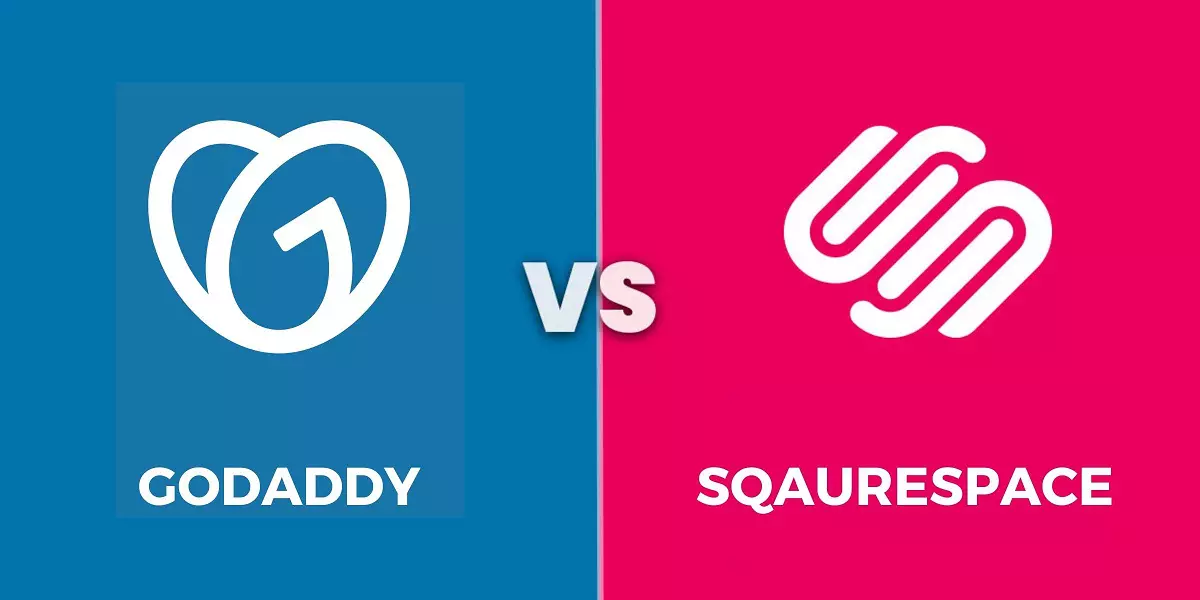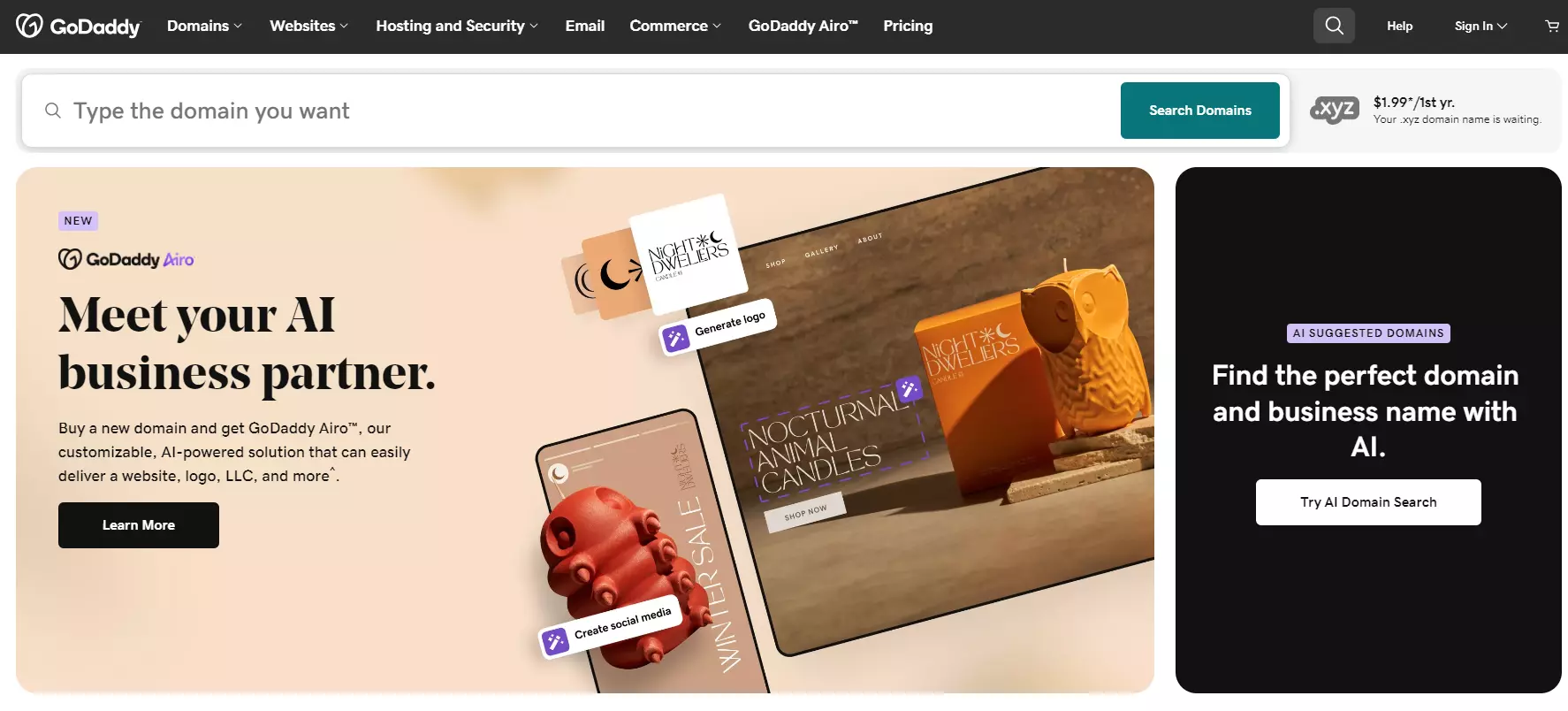
In the world of website builders, Squarespace and GoDaddy are two popular choices for users aiming to establish their online presence. Both platforms offer extensive templates, intuitive interfaces, and built-in marketing tools, but each also brings unique features to the table.
To help you make an informed decision, we've thoroughly tested and evaluated websites built with both GoDaddy and Squarespace.
In this article, we present a detailed comparison of these website builders, providing you with the insights needed to choose the ideal solution for your specific needs.
What is Squarespace?

Squarespace is one of the leading website builders on the market, renowned for offering users a seamless experience from start to finish.
Its popular drag-and-drop editor and cost-effective plans make Squarespace ideal for beginners.
Creatives will also appreciate the extensive design options available, allowing them to build visually stunning websites with ease.
What is Godaddy?

Established in 1997, GoDaddy is a global frontrunner in web hosting and domain registration. With over 20 million clients and 82 million domain names under management, GoDaddy has played a significant role in making the Internet accessible to everyone.
The company offers a broad range of services, from website creation and e-commerce solutions to professional email and digital marketing tools.
GoDaddy’s strength lies in its ability to cater to both beginners and seasoned users. In this overview, we will explore the key services provided by GoDaddy and its reach into the Chinese market, a crucial area for expansion.
GoDaddy vs. Squarespace Key Features
In this section, we'll explore the key features offered by Squarespace and GoDaddy.
Website Builder
Squarespace stands out primarily because of its website builder, renowned for its flexibility and user-friendliness, making it a top choice over competitors. With Squarespace, crafting visually stunning websites is a breeze, thanks to its plethora of professionally designed themes and extensive customization options.
While GoDaddy's website builder isn't lacking, it does have somewhat limited capabilities compared to Squarespace. Utilizing Artificial Design Intelligence (ADI), GoDaddy auto-generates websites based on user preferences, resulting in somewhat generic designs. However, users can still modify and personalize these templates to some extent. Yet, due to its non-scratch-building nature, GoDaddy's platform offers less control compared to Squarespace.
When it comes to design and customization, Squarespace outshines GoDaddy, much like comparing Bluehost to Squarespace, albeit Bluehost lacks a similar website builder feature. GoDaddy provides four distinct plans for its website builder, priced between $6 and $20 monthly, inclusive of free web hosting. Additionally, regardless of the selected plan, users can enjoy a one-month free trial.
Domain Registration
Getting a new domain through Squarespace will cost you $20 annually, a tad pricier than other providers. This price difference is why Squarespace and its counterparts struggle against GoDaddy. Nonetheless, domain renewals remain consistent in price, and each Squarespace domain registration comes with a complimentary SSL certificate and WHOIS privacy protection. Additionally, signing up for an annual hosting plan grants you a free domain for the first year.
For years, GoDaddy has reigned as the world's top domain registrar. Their initial domain registration fee is a mere $4.88, with subsequent renewals priced at $17.99. GoDaddy also offers WHOIS privacy protection and an SSL certificate, though the latter is included only in specific hosting packages. Some of GoDaddy's hosting plans also offer a free domain, although not all, unlike Squarespace.
Domain Emails
Squarespace and GoDaddy both provide domain emails as part of their hosting packages, but the process differs between the two. Squarespace collaborates with Google, granting users access to Google's G Suite. This suite encompasses various functionalities like business email addresses, Google Drive, Google Calendar, and additional features. However, accessing the G Suite incurs an additional monthly fee for customers.
GoDaddy shares a parallel collaboration with Microsoft, furnishing a range of analogous functionalities. These encompass domain emails, storage, and an online calendar, among others. While GoDaddy grants complimentary access to the Microsoft Office 365 suite with its shared hosting packages for the initial year, subsequent usage mandates a monthly subscription fee, mirroring Squarespace's model.
eCommerce
Squarespace and GoDaddy each present a diverse array of eCommerce-oriented functionalities catering to those establishing online stores. These encompass email marketing utilities, SEO aids, sophisticated analytics, seamless social media amalgamation, abandoned cart retrieval, and additional features. In the realm of eCommerce, the two entities exhibit relative parity, albeit with a caveat: Squarespace levies transaction fees on two of its three hosting plans integrating eCommerce capabilities. Conversely, Squarespace permits the sale of specific digital products, positioning it as a compelling alternative to Wix, whereas GoDaddy predominantly focuses on tangible goods.
Another primary distinction lies in the pricing structure. Squarespace seamlessly incorporates eCommerce tools into its hosting plans, though the two priciest options are tailored explicitly for this function. Conversely, GoDaddy provides users with the flexibility to append an online store to any of its hosting plans. This affords customers greater versatility, albeit at a cost of $30 per month, exceeding Squarespace's $26 Basic Commerce plan sans hosting. Nevertheless, GoDaddy extends a 14-day complimentary trial for users to initially evaluate its eCommerce capabilities.
Conclusion on Squarespace Vs Godaddy
Between these two options, GoDaddy offers a faster and more cost-effective way to build a website. It's an excellent choice for small businesses aiming to get online quickly and affordably, even if it means sacrificing some creative flexibility for speed.
Squarespace, with its visually appealing templates, is ideal for the creative sector. High-quality photography can significantly enhance the websites of artists, bloggers, and specific online stores. Squarespace is a great option for those willing to invest time and money in creating a memorable online presence.

